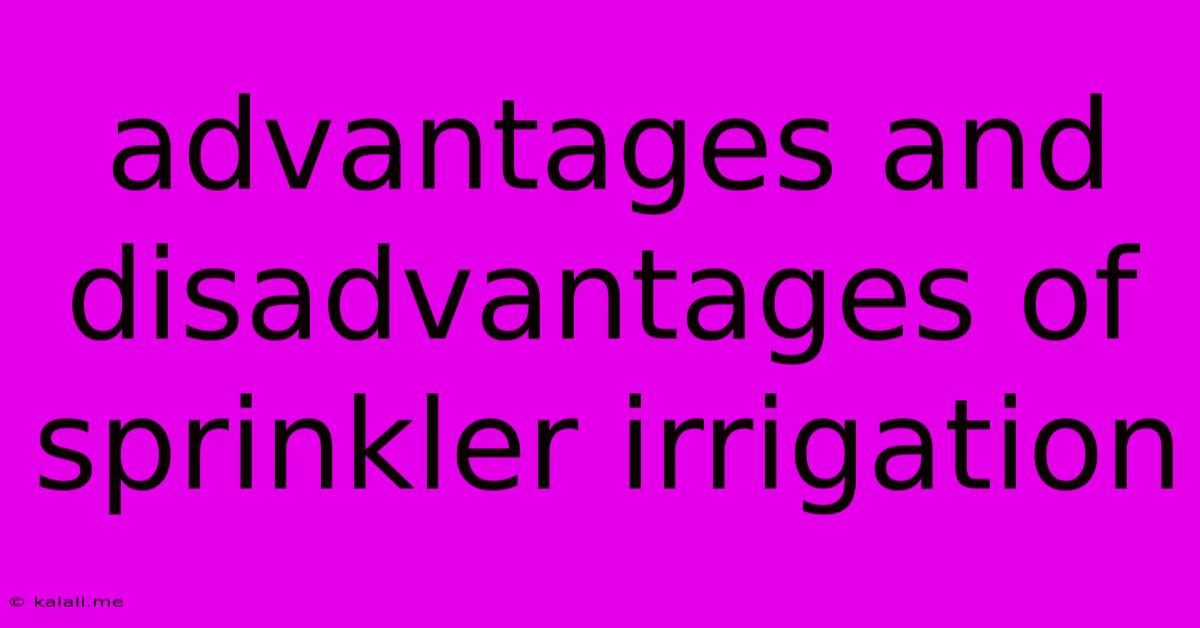Advantages And Disadvantages Of Sprinkler Irrigation
Kalali
Jun 14, 2025 · 4 min read

Table of Contents
Advantages and Disadvantages of Sprinkler Irrigation
Sprinkler irrigation, a widely used method of watering crops and landscapes, involves distributing water through a network of pipes and sprinklers. While offering numerous benefits, it also presents certain drawbacks. Understanding both the advantages and disadvantages is crucial for making informed decisions about its suitability for your specific needs. This article will delve into the pros and cons of sprinkler irrigation, helping you determine if it's the right choice for your project.
Advantages of Sprinkler Irrigation
Sprinkler irrigation boasts several key benefits that make it a popular choice for various applications.
1. Water Efficiency (in comparison to flood irrigation): While not as efficient as drip irrigation, sprinkler systems are significantly more water-efficient than traditional flood irrigation. They deliver water directly to the plants' root zones, minimizing water loss due to runoff and evaporation. This translates to lower water bills and reduced strain on water resources. Proper system design and maintenance are crucial to maximizing this advantage.
2. Versatility and Applicability: Sprinkler systems can be adapted to a wide range of terrains, crops, and landscapes. From large-scale agricultural fields to smaller residential lawns and gardens, their flexibility makes them a versatile irrigation solution. Different sprinkler types, such as impact sprinklers, rotary sprinklers, and pop-up sprinklers, can be chosen to suit specific needs.
3. Uniform Water Distribution (with proper design and maintenance): With a well-designed and maintained sprinkler system, water distribution can be relatively uniform across the irrigated area. This ensures that all plants receive adequate moisture, promoting healthy growth and consistent yields. Regular inspection and nozzle adjustments are key to achieving even distribution.
4. Ease of Automation and Control: Modern sprinkler systems often incorporate automated controls, timers, and sensors. This allows for precise scheduling and efficient water management, minimizing water waste and optimizing irrigation based on weather conditions and soil moisture levels. Smart irrigation controllers further enhance control and efficiency.
5. Cooling Effect: In hot, dry climates, sprinkler irrigation can provide a cooling effect to the plants and surrounding environment, reducing stress on the plants and potentially improving crop yields. This is especially beneficial for sensitive crops.
6. Relatively Low Initial Cost (compared to drip irrigation): While the long-term cost savings might be less than drip irrigation, the initial investment for a sprinkler system is generally lower than for a drip irrigation system, particularly for larger areas.
Disadvantages of Sprinkler Irrigation
Despite its advantages, sprinkler irrigation also comes with several limitations.
1. Water Loss Due to Evaporation and Wind Drift: A significant portion of the water applied through sprinkler irrigation can be lost to evaporation, especially in hot, windy conditions. Wind can also drift the water away from the target area, reducing efficiency and potentially causing water waste. Choosing appropriate sprinkler types and scheduling irrigation during cooler, calmer periods can help mitigate these losses.
2. Higher Water Pressure Requirements: Sprinkler systems typically require higher water pressure than other irrigation methods such as drip irrigation. This can necessitate the use of pumps and pressure regulators, adding to the initial cost and complexity of the system.
3. Potential for Soil Erosion: The impact of water from sprinklers can erode the topsoil, especially in areas with light or sandy soils. This can lead to soil degradation and reduced fertility. Careful planning and the use of appropriate soil management techniques can help to minimize erosion.
4. Wetting of Foliage: Sprinkling can wet plant foliage, which can increase the risk of fungal diseases and other plant pathogens. This is particularly concerning in humid climates. This disadvantage is often mitigated by careful scheduling and proper nozzle selection.
5. Inefficient for Steep Slopes: Sprinkler irrigation can be less efficient on steep slopes, where water runoff is more likely to occur. Terracing or other soil modification techniques may be necessary to improve efficiency in such conditions.
6. Maintenance Requirements: Sprinkler systems require regular maintenance to ensure optimal performance and longevity. This includes cleaning or replacing nozzles, checking for leaks, and making repairs as needed.
Conclusion
Sprinkler irrigation offers a balance of advantages and disadvantages. While it is a versatile and relatively cost-effective method for many applications, it's crucial to carefully consider the potential drawbacks, especially concerning water loss and potential for soil erosion. A well-designed and properly maintained system, coupled with appropriate site conditions, can significantly enhance its efficiency and effectiveness. Weighing these factors carefully will help determine whether sprinkler irrigation is the right choice for your specific needs.
Latest Posts
Latest Posts
-
Which Of The Following Is Not Considered A Greenhouse Gas
Jun 15, 2025
-
What Is The Difference Between Z Test And T Test
Jun 15, 2025
-
What Is The Lcm Of 6 8 12
Jun 15, 2025
-
Lcm Of 12 8 And 4
Jun 15, 2025
-
What Is The Factor Of 38
Jun 15, 2025
Related Post
Thank you for visiting our website which covers about Advantages And Disadvantages Of Sprinkler Irrigation . We hope the information provided has been useful to you. Feel free to contact us if you have any questions or need further assistance. See you next time and don't miss to bookmark.